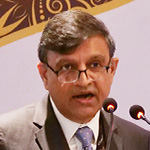The modern era of insurance
By Anoop Khanna
Delivering his special welcome address yesterday morning, GIC Re chairman and managing director Devesh Srivastava said, the 1 January renewals, though not unprecedented, are a first for many insurance practitioners so used to soft market conditions. Life has come a full cycle and so has the market.

He said, “We all talk of hard and soft cycles in our industry. Given the absolute mayhem witnessed in the renewals, should we not pause to consider a very basic tenet of reinsurance? If reinsurance is meant to even out the crests and troughs in an insurance company’s balance sheet, should that not translate into a complete absence of a cyclical market in our business?”
Mr Srivastava said that four factors hint that the market cycle has changed considerably and that maybe the traditional hard-soft markets shouldn’t apply in the modern era. He said these four factors are: Capital is still available; rate increases have varied significantly by class of business; there is no certainty about the rate adequacy; and cyber is another area where the rates being charged are debatable.
He said these four factors strongly suggest that things are different this time around. They indicate that possibly this hard market cycle is more of an amalgamation of ‘small waves’ rather than an overall tide.
He said, “We must also bear in mind that these hardening trends are not a flash in the pan but are expected to continue for a couple of years. It is now for us to brace for the tough times ahead and educate our clients on the importance of sustainability for the future of our industry.”
Further regulatory support

International Financial Services Centre Authority (IFSCA) executive director Praveen Trivedi in his address ‘Fostering the growth of insurance sector in GIFT-IFSC’ said there has been a 200% rise in the growth of IFSC entities over the last two years.
“From 129 in September 2020, we now have 391 entities operating from GIFT-IFSC. We offer a competitive tax structure and tax regime with several encouraging features. The GICT-IFSC has also developed an aircraft leasing and financing hub ecosystem and it offers a 360-degree approach to this market.”
Making a specific mention of GIFT-IFSC insurance ecosystem, Mr Trivedi said IFSC insurance regulations are benchmarked with international best practices. He said GIFT-IFSC provides reinsurance support to the following categories of entities.
- IFSC Insurance Offices (IIOs) of direct insurers in IFSC
- Reinsurance support to IIOs (reinsures) in IFSC
- Reinsurance business from cedants based in India, subject to order of preference under the IRDAI (Reinsurance) Regulations 2018. Currently, IIOs are ranked above cross border reinsurers (CBRs)
- Reinsurance and retrocession to cedants/reinsurers based outside India
It also supports setting up of regional headquarters for Asian market and 100% tax holiday period is extended to 10 years out of any 15 years. No GST is levied on services rendered in IFSC or to an IFSC unit.
Growth despite challenges

New India Assurance Company chairman and managing director New India Assurance Company Neerja Kapoor in her special address, ‘Winds of change’ said the food and energy crises, global inflation, unsustainable debt levels, geopolitical confrontation and climate change, all add up to the present global turmoil.
She said, the Indian insurance industry, however, is poised to take off on a growth trajectory. “Over the next decade we expect to see a strong double-digit growth in the market. By 2032 we are set to become the sixth largest insurance market in the world and non-life is expected to perform better than life insurance due to low penetration.”
Ms Kapoor said global reinsurers can no longer afford to ignore the Indian insurance market. Appreciating the efforts being made by the Indian regulator, IRDAI to achieve insurance for all, she said IRDAI is leaving no stone unturned. Over the last 12 months a complete overhaul of the regulatory regime has been initiated. This is bound to create an insurance market where ease of doing business is the priority.
She said, “Very soon we expect a transition from an overly prescriptive regime to a principle-based outcome driven regulation and an open market unhindered by regulatory arbitrage is expected to emerge.”